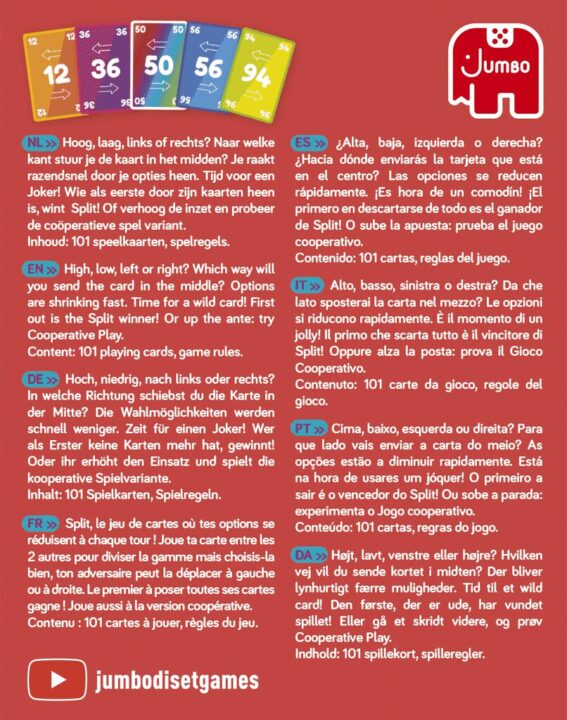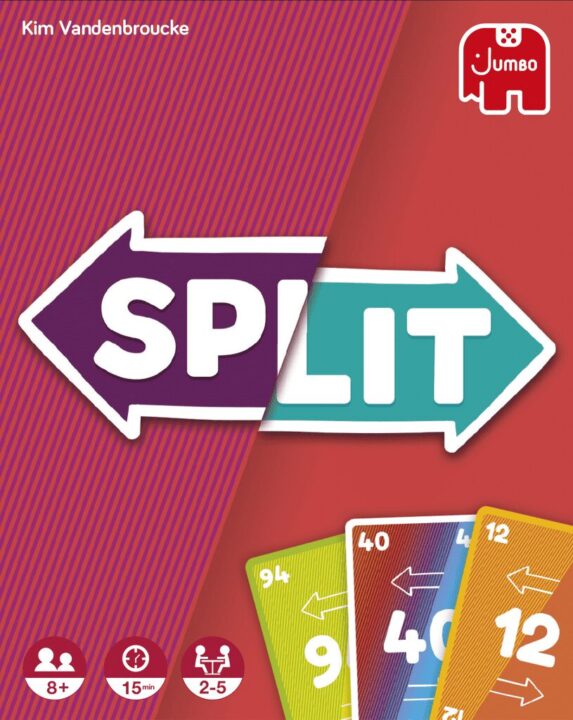Overview
Hey, fellow board game enthusiasts! Jamie here, bringing you the scoop on the latest game to hit our tables – ‘Split‘. In this review, we’ll unpack everything from the nitty-gritty of gameplay mechanics to whether luck will have you flipping the board. So, grab your snacks, gather ’round, and let’s see if Split makes the cut or splits opinions!
How It Plays
Setting Up
First, lay out the game board and shuffle the deck of cards. Each player picks a color and takes the corresponding pieces. Then, deal five cards to each player.
Gameplay
Players take turns drawing a card from the deck and playing one from their hand onto the board. The goal is to split the board, creating territories. You can place a card next to cards of the same color to expand your area. But watch out! Other players can cut into your territory, making the game a real brain-teaser.
Winning the Game
The game ends when no more cards can be played. Players then count the squares in their largest connected territory. The player with the most squares wins. It’s all about strategy, making smart moves, and sometimes a bit of luck.
Want to know more? Read our extensive strategy guide for Split.
Exploring the Unique Gameplay Mechanics of Split
When we first laid eyes on Split, it was clear this wasn’t your run-of-the-mill board game. The core of the gameplay is genius in its simplicity: you’re always making decisions with a split mind, balancing immediate gains against future prospects. Each turn feels like you’re at a crossroads, deciding which path to take. The mechanics promote a smooth flow, reducing downtime and keeping all players engaged. You won’t find yourself twiddling your thumbs waiting for someone to make a move. Instead, you’re constantly involved, plotting your next step or guessing your friends’ moves.
The way the game forces you to split your focus is both a challenge and a delight. You’re not just playing against your friends; you’re also battling your own instincts, making each victory that much sweeter. And just when you think you’ve mastered the flow, the game throws a curveball that changes everything.
Now, as we pivot from the mechanics, let’s delve into the fine balance of strategy versus luck in Split.

Striking the Balance: Strategy vs. Luck in Split
When you sit down to play Split, you quickly realize it’s not just another luck-based game. No, sir. This game teases your brain, making you weigh each decision on a finely tuned scale of strategy and chance. It’s like walking a tightrope between planning your next big move and hoping the game gods are in a good mood. Every card you draw thrusts you deeper into this dance between control and chaos, but it’s not all up to fate. Your victory depends significantly on how well you can anticipate your opponents’ moves and adapt your strategy on the fly. So, while you might blame a bad draw for a loss, it’s often your strategic choices that seal your fate.
But don’t let the strategy talk scare you. Split has a way of keeping things light and engaging, making it a hit for strategy aficionados and luck lovers alike. It’s this blend that keeps you coming back for more, eager to outsmart or, let’s be honest, out-luck your friends.
Peeking into the next section, we’ll uncover the treasures hidden in the quality and design of Split’s game components.

Top-Notch Components Elevate Split’s Appeal
When it comes to Split, the quality and design of the game components are nothing short of stellar. Pulling the game box off the shelf, you’re immediately greeted with a robust and colorful design that promises fun times ahead. The game’s cards are thick, durable, and feature vivid illustrations that not only catch the eye but also help in immersing players into the game’s unique charm. The tokens and game pieces are made from high-quality materials that feel good in your hand, adding a tactile pleasure to the gameplay experience.
Moreover, the game board itself is a work of art. It’s clear that the designers of Split put a lot of thought into making the playing surface both functional and visually appealing. The layout is intuitive, making it easy for new players to jump right in, while the artistic touches keep the board interesting game after game.
Now, let’s flip the card to see how Split scores on fun factor and replayability.
Why Split Will Keep You Coming Back for More
Let me tell you, Split isn’t just another board game you play once and shove to the back of the closet. Nope, it’s got this magic mix that makes you wanna come back for more. Every game night, it’s like, “Hey, how about Split?” And nobody ever groans. Why? Cue the drum roll… It’s the fun factor and replayability!
The game’s setup and rules are simple enough, but don’t let that fool ya. Every round is a fresh puzzle of choices. Split has a knack for sparking laughter and those “aha!” moments that keep everyone on their toes. Plus, the game’s design means no two games are quite the same. You think you’ve figured it out, and bam, next game’s a whole new ball game.
So, would I recommend Split? In a heartbeat! It’s a blast to play, easy to learn but hard to master, and it’ll be a hit on game night.
Conclusion
So, wrapping up this dive into ‘Split’, let me say, it’s a blast. But not without its quirks. The game beautifully marries strategy and luck, ensuring that each playthrough feels fresh. Sure, sometimes Lady Luck might not be on your side, which can be a bummer if you’re all about the tactics. But hey, that’s life, right? The components? Top-notch. It’s clear the creators put a lot of thought into the design and quality, making the game not only fun to play but also a feast for the eyes. And replayability? Through the roof. Whether it’s a game night staple or a once-in-a-while venture, ‘Split’ delivers. So, would I recommend you dropping your hard-earned cash on it? Absolutely – if you’re into a mix of strategy and the thrill of the luck of the draw. In the grand scheme of board games, I’d say ‘Split’ earns a solid spot. And that, my friends, concludes our journey through ‘Split’. Happy gaming!

